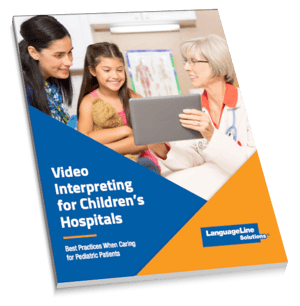When it comes to communication between children, their families, and paediatric healthcare providers, it’s critical that everyone understands each other.
Add in a language barrier, and this understanding becomes all the more challenging.
In our new case study, “Video Interpreting for Children's Hospitals: Best Practices When Caring for Paediatric Patients” we discuss how some of America’s top children’s hospitals are using video remote interpreting to improve communication, productivity, and patient outcomes.
We speak with experts from Boston Children’s Hospital, Children’s Health System of Texas, and Children’s Specialised Hospital. These institutions are finding that video remote interpreting is revolutionising the way they communicate with patients and families who speak limited English, are Deaf or are Hard of Hearing.
 In this e-book, you will learn:
In this e-book, you will learn:
- How the top children’s hospitals are discovering that video remote interpreting (VRI) is particularly helpful with paediatric patients
- Best practices for using video interpreting with this patient community.
- The strategic benefits of VRI that improve patient outcomes while also speaking to those who oversee hospital budgets.
Click here to download